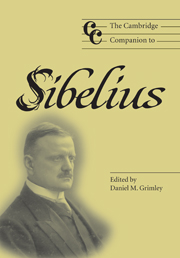Book contents
- Frontmatter
- Introduction
- Part I Forging a voice: perspectives on Sibelius's biography
- Part II Musical works
- Part III Influence and reception
- 10 Sub umbra Sibelii: Sibelius and his successors
- 11 Sibelius and Germany: Wahrhaftigkeit beyond Allnatur
- 12 Sibelius in Britain
- 13 Sibelius and contemporary music
- Part IV Interpreting Sibelius
- Notes
- Select bibliography
- Index of names and works
11 - Sibelius and Germany: Wahrhaftigkeit beyond Allnatur
from Part III - Influence and reception
Published online by Cambridge University Press: 28 September 2011
- Frontmatter
- Introduction
- Part I Forging a voice: perspectives on Sibelius's biography
- Part II Musical works
- Part III Influence and reception
- 10 Sub umbra Sibelii: Sibelius and his successors
- 11 Sibelius and Germany: Wahrhaftigkeit beyond Allnatur
- 12 Sibelius in Britain
- 13 Sibelius and contemporary music
- Part IV Interpreting Sibelius
- Notes
- Select bibliography
- Index of names and works
Summary
Celebrating the music and musician
In 1921, the Academy of Fine Arts in Berlin elected Jean Sibelius as an honorary fellow. Even if, as a foreigner, he could not become a full member, it was a great honour for a Finnish composer. In a letter to the composer dated 21 July 1921, the committee chairman, conservative composer Friedrich E. Koch, cited the exceptional ‘truthfulness’ (Wahrhaftigkeit) of Sibelius's music as the basis for their decision. Ironically, the concept of Wahrhaftigkeit in Sibelius's work has subsequently been one of the most problematic areas of his critical reception: the notion of ‘musical truth’ had very different connotations for the theorists of the Frankfurt School such as Adorno. Yet at the time, the accolade was a sign of deep appreciation, based on Sibelius's output as far as his Fifth Symphony. By the time the distinguished Regia Accademia di Santa Cecilia in Rome had asked him to join the Comitato Internazionale d'Onore in 1916, Sibelius had been widely acknowledged as a leading representative of the last Romantic generation in European music. In Santa Cecilia he joined a host of other musical celebrities, including Guido Adler, Arrigo Boito, Max Bruch, Claude Debussy, Edward Elgar, Alexander Glazunov, Carl Goldmark, Engelbert Humperdinck, Vincent d'Indy, Giacomo Puccini, Camille Saint-Saëns, Max Reger, Alexander Skryabin, Charles V. Stanford and Richard Strauss. This was, by any standards, an impressive range of great turn-of-the-century European musicians, even exceeding the Bertin Academy, and eloquently attests to the international reputation that Sibelius's music already enjoyed.
- Type
- Chapter
- Information
- The Cambridge Companion to Sibelius , pp. 169 - 181Publisher: Cambridge University PressPrint publication year: 2004

